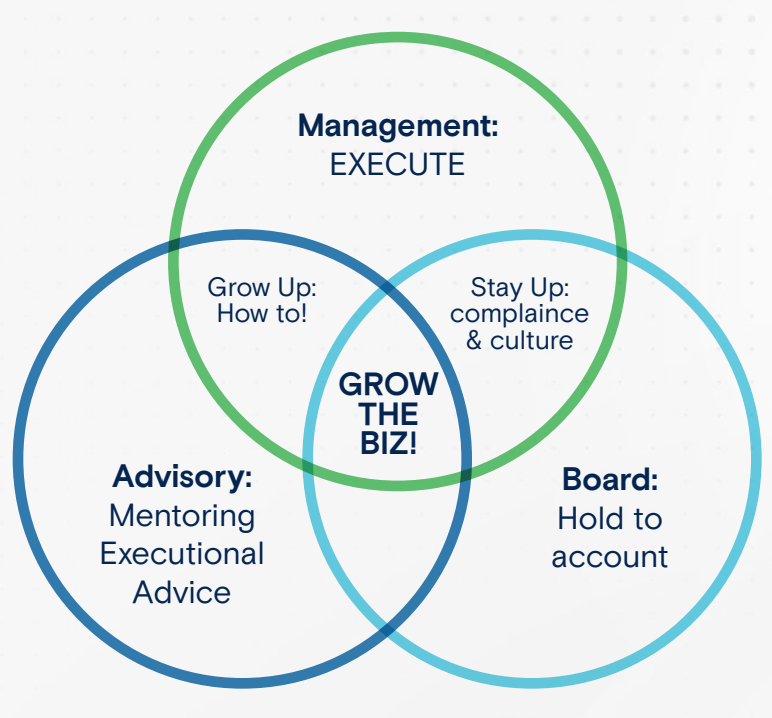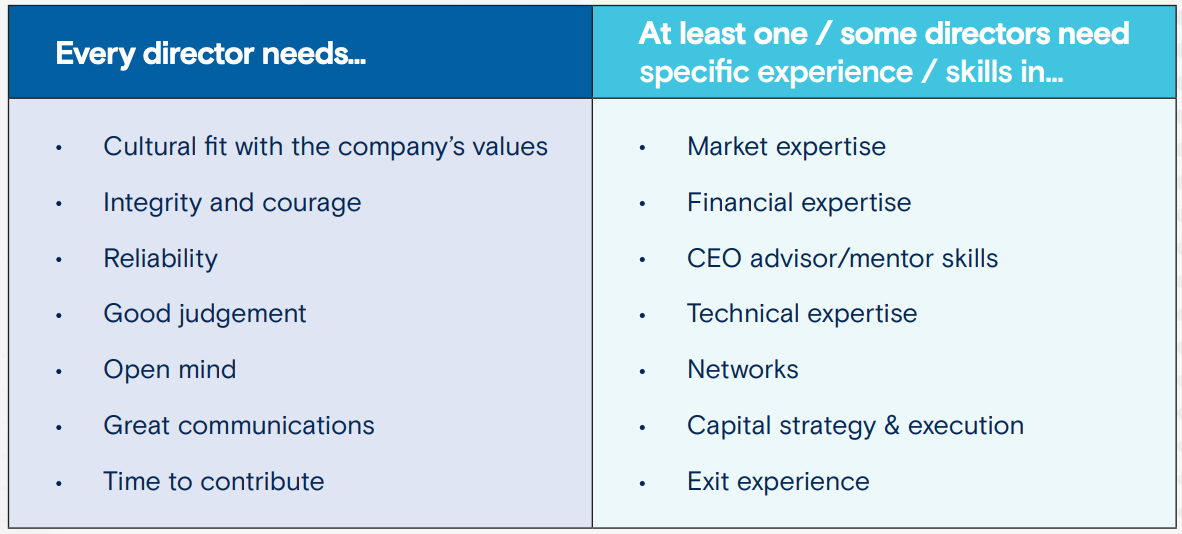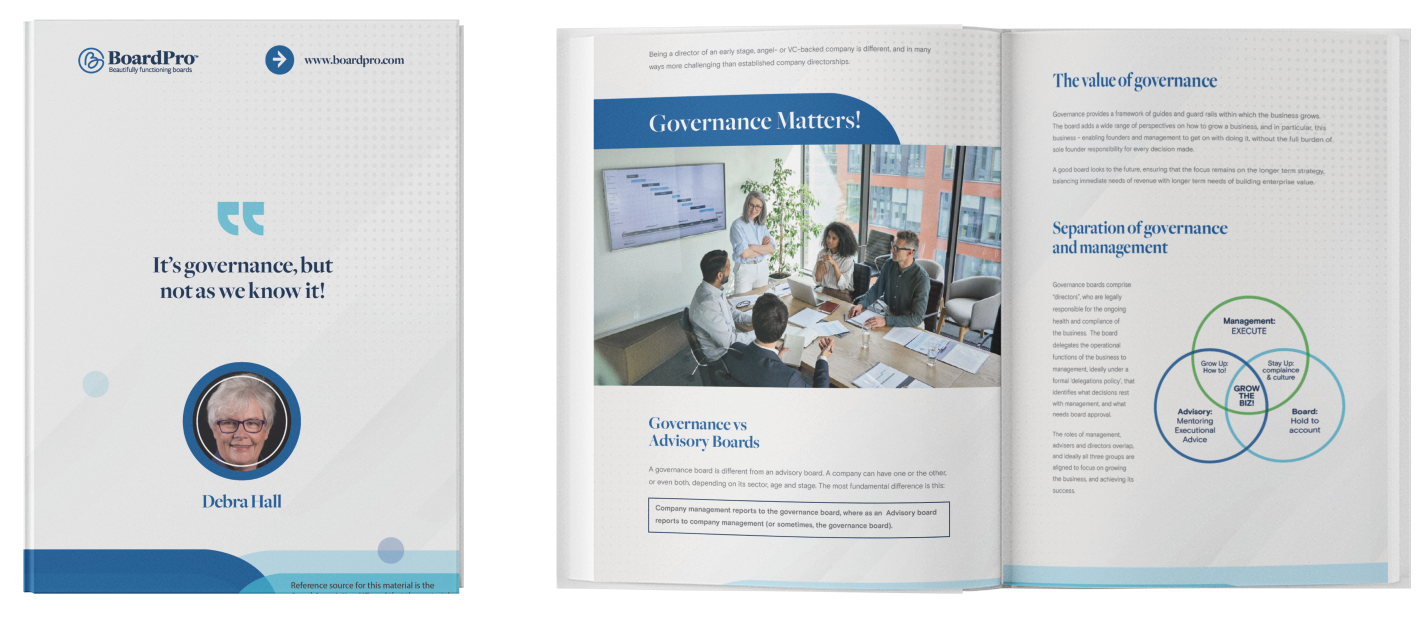Governance in Startups and Early Stage Companies
Governance is an essential element of business success - especially in early-stage startups. Newborn companies are usually in the most in need of the support structure that a small, fit-for-purpose board provides. The earlier that board is put in place, the better it should be for the founders and for the company.
Lead presenter on BoardPro's recent startup governance webinar, Debra Hall reflected on her own experience of starting a business, some 30 years ago.
“It was hard, and honestly, I wish I’d known what I know today. I had no experience at all of owning or managing a business - had never really known a business owner – so it was first principles all the way. It didn’t occur to me to recruit a board, or even surround myself with a bevy of trusted advisers. I relied totally on my husband for support – and he was great – but looking back, a good board might have enabled us to grow faster, and to do more. In particular, a good board would have encouraged me to hand over the management reins well before I actually did, leaving me free to do the 'rainmaking' without being wrapped up in the day-to-day minutiae of the business – that I was seriously bad at!”
But not all directors are a good fit for start-up businesses. Startup directors are a special breed. They generally have a much higher risk appetite than your average corporate director, and the courage to act on what is sometimes scant information. Moving the company forward requires decisiveness, and the willingness to pivot on a penny if need be. Being willing to admit you were wrong, and having a plan B, plan C and more is all part of the essential toolkit.
For the entrepreneur, bringing these ‘strangers’ into the inner circle of your business, taking shared responsibility for the company itself, is also a step not to be taken lightly. The company’s first directors will inevitable make or break the business – and getting rid of the wrong people is perhaps even harder than getting rid of a bad employee hire. Debra says “I encourage founders to do at least as much due diligence on potential directors as we investors do on the founders and the company – you’re going to be stuck with these people, and if you’re CEO, actually reporting to them!”
When it works, the company flies – and that’s why early stage directors do what they do. The financial rewards are negligible (unless you manage to grow a unicorn), but the emotional rewards of seeing the next generation of businesses grow, under your stewardship, are without equal.
Governance vs Advisory Boards
A governance board is different from an advisory board. A company can have one or the other or even both, depending on its sector, age and stage. The most fundamental difference is this:
Company management reports to the governance board, where as an Advisory board reports to company management (or sometimes, the governance board).
The value of governance
Governance provides a framework of guides and guard rails within which the business grows. The board adds a wide range of perspectives on how to grow a business, and in particular, this business – enabling founders and management to get on with doing it, without the full burden of sole founder responsibility for every decision made.
A good board looks to the future, ensuring that the focus remains on the longer term strategy, balancing immediate needs of revenue with longer term needs of building enterprise value.
Separation of governance and management
Governance boards comprise “directors”, who are legally responsible for the ongoing health and compliance of the business. The board delegates the operational functions of the business to management, ideally under a formal ‘delegations policy’, that identifies what decisions rest with management, and what needs board approval.
The roles of management, advisers and directors overlap, and ideally all three groups are aligned to focus on growing the business, and achieving its success.

Early Stage Boards focus on Strategy and risk
Governance boards have four roles, often referred to as the “Four Pillars” of governance (ref. NZ Institute of Directors). In early stage companies, boards remain responsible for these four functions, even though there are significant operational differences from established business governance.
The four functions of the board are:
- Strategy & Risk: (why are we here, where are we going, how are we going to get there, how much risk will we take?
- Culture: how do we do things around here (especially when things go wrong!)?
- Accountability: do we hold people to account to do what they say they will do
- Compliance: are we monitoring liquidity, and staying ‘legal’ in every way
Key differences for early stage boards
- The extent of involvement of directors in the day to day business is significantly greater in early stage companies, in some cases extending into an executive director role. It’s a balancing act – the key is knowing when you’re acting as a director, and when you’re straying into management / operational roles.
- Process vs speed: the early stage company needs its board to be decisive even in the face of scant or imperfect information. Delayed decisions hold the business back, and may even lead to its demise. Frequent critical decisions are the norm.
- Access to professional advice is extremely limited for early stage directors, and involves tapping into informal relationships. Accounts are generally unaudited in the early days, and legal support is only used for business critical issues. Boards need to be alert for situations where professional (paid) legal advice is required, and ensure that they are using advisers who are experienced in dealing with early stage company issues.
- Capital strategy / solvency: early stage boards are always focused on managing the company’s cash runway. A capital strategy is critical to ensuring that the business has the resources to achieve its growth potential. Fund raising experience and capability is a must-have on early stage boards.
- Exit strategy – at some stage, the company’s early investors will want liquidity. It is the Board’s role to have an eye on the longer term horizon to achieve this.
Establish a 'fit for purpose' Board & review regularly

Changing the Board
In early stage, high growth businesses, regular board changes are expected, and highly desirable. It is imperative to refresh the board to meet the company’s changing needs, particularly as the company heads toward a liquidity event. Early stage directors need to be willing to step down to make space for those more capable of taking the company to the next stage of its growth.

Share this
You May Also Like
These Related Stories

8 Governance Tools Every Board Should be Using

Building an Effective Board: A Step-by-Step Guide for Start-up Companies and Non-Profits
/61c4e2784aed2cf9bdc0da37_7%20steps-1.jpg)

